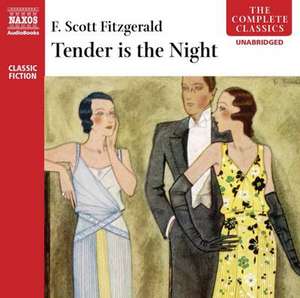Tender is the Night: Classic Fiction
Autor F. Scott Fitzgeralden Limba Engleză CD-Audio – feb 2010
| Toate formatele și edițiile | Preț | Express |
|---|---|---|
| Paperback (13) | 21.05 lei 3-5 săpt. | +10.13 lei 4-10 zile |
| HarperCollins Publishers – 2012 | 21.05 lei 3-5 săpt. | +10.13 lei 4-10 zile |
| Penguin Books – 6 iun 2018 | 44.53 lei 24-35 zile | +18.66 lei 4-10 zile |
| Arcturus Publishing – 15 iul 2016 | 45.30 lei 3-5 săpt. | +9.47 lei 4-10 zile |
| ALMA BOOKS – 24 sep 2018 | 45.79 lei 3-5 săpt. | +11.25 lei 4-10 zile |
| Penguin Books – 24 feb 1999 | 47.67 lei 24-35 zile | +16.89 lei 4-10 zile |
| Vintage Publishing – 6 ian 2011 | 48.95 lei 24-35 zile | +19.03 lei 4-10 zile |
| Penguin Books – 27 iun 2001 | 49.52 lei 24-35 zile | +19.97 lei 4-10 zile |
| Alma Books COMMIS – 16 aug 2012 | 51.88 lei 3-5 săpt. | +11.19 lei 4-10 zile |
| SCRIBNER UK – 12 sep 2024 | 52.88 lei 24-36 zile | +24.92 lei 4-10 zile |
| HarperCollins Publishers – sep 2021 | 59.02 lei 3-5 săpt. | +14.99 lei 4-10 zile |
| Scribner – iul 1995 | 105.36 lei 3-5 săpt. | |
| TingleBooks – 29 iul 2020 | 138.93 lei 6-8 săpt. | |
| Cambridge University Press – 14 dec 2022 | 213.47 lei 6-8 săpt. | |
| Hardback (4) | 47.66 lei 3-5 săpt. | +31.68 lei 4-10 zile |
| MacMillan Collector's Library – 8 sep 2016 | 47.66 lei 3-5 săpt. | +31.68 lei 4-10 zile |
| Penguin Books – 3 noi 2010 | 109.71 lei 3-5 săpt. | +21.71 lei 4-10 zile |
| Scribner – 31 mai 1996 | 182.58 lei 3-5 săpt. | |
| Read & Co. Classics – 21 oct 2022 | 170.22 lei 6-8 săpt. |
Preț: 223.38 lei
Nou
37.72€ • 39.23$ • 31.14£
Indisponibil temporar
Specificații
ISBN-10: 9626344571
Dimensiuni: 165 x 138 x 28 mm
Greutate: 0.3 kg
Editura: NAXOS Audiobooks
Seria Classic Fiction
Recenzii
Descriere
Set in the South of France in the decade after the First World War, Tender is the Night explores the new world of moneyed leisure found by the first generation of idle-rich Americans to take refuge in the French Riviera, bracketed between the horrors of the Great War and the Great Depression to come. It is the story of a brilliant and magnetic psychiatrist named Dick Diver; the bewitching, wealthy, and dangerously unstable mental patient, Nicole, who becomes his wife; and the beautiful, harrowing ten-year pas de deux they act out along the border between sanity and madness. F.
Scott Fitzgerald deliberately set out to write the most ambitious and far-reaching novel of his career, experimenting radically with narrative conventions of chronology and point of view and drawing on early breakthroughs in psychiatry to enrich his account of the makeup and breakdown of character and culture. This stunning Macmillan Collector's Library edition of Tender is the Night features an afterword by Ned Halley.
Notă biografică
In 1920 he married Zelda Sayre. Their destructive relationship and her subsequent mental breakdowns became a major influence on his writing. Among his publications were five novels, This Side of Paradise, The Great Gatsby, The Beautiful and Damned, Tender is the Night and The Love of the Last Tycoon (his last and unfinished work): six volumes of short stories and The Crack-Up, a selection of autobiographical pieces.
Fitzgerald died suddenly in 1940. After his death The New York Times said of him that 'He was better than he knew, for in fact and in the literary sense he invented a "generation" ... he might have interpreted them and even guided them, as in their middle years they saw a different and nobler freedom threatened with destruction.'
Extras
I
On the pleasant shore of the French Riviera, about half way between Marseilles and the Italian border, stands a large, proud, rose-colored hotel. Deferential palms cool its flushed façade, and before it stretches a short dazzling beach. Lately it has become a summer resort of notable and fashionable people; a decade ago it was almost deserted after its English clientele went north in April. Now, many bungalows cluster near it, but when this story begins only the cupolas of a dozen old villas rotted like water lilies among the massed pines between Gausse’s Hôtel des Étrangers and Cannes, five miles away.
The hotel and its bright tan prayer rug of a beach were one. In the early morning the distant image of Cannes, the pink and cream of old fortifications, the purple Alp that bounded Italy, were cast across the water and lay quavering in the ripples and rings sent up by sea-plants through the clear shallows. Before eight a man came down to the beach in a blue bathrobe and with much preliminary application to his person of the chilly water, and much grunting and loud breathing, floundered a minute in the sea. When he had gone, beach and bay were quiet for an hour. Merchantmen crawled westward on the horizon; bus boys shouted in the hotel court; the dew dried upon the pines. In another hour the horns of motors began to blow down from the winding road along the low range of the Maures, which separates the littoral from true Provençal France.
A mile from the sea, where pines give way to dusty poplars, is an isolated railroad stop, whence one June morning in 1925 a victoria brought a woman and her daughter down to Gausse’s Hotel. The mother’s face was of a fading prettiness that would soon be patted with broken veins; her expression was both tranquil and aware in a pleasant way. However, one’s eyes moved on quickly to her daughter, who had magic in her pink palms and her cheeks lit to a lovely flame, like the thrilling flush of children after their cold baths in the evening. Her fine high forehead sloped gently up to where her hair, bordering it like an armorial shield, burst into lovelocks and waves and curlicues of ash blonde and gold. Her eyes were bright, big, clear, wet, and shining, the color of her cheeks was real, breaking close to the surface from the strong young pump of her heart. Her body hovered delicately on the last edge of childhood—she was almost eighteen, nearly complete, but the dew was still on her.
As sea and sky appeared below them in a thin, hot line the mother said:
“Something tells me we’re not going to like this place.”
“I want to go home anyhow,” the girl answered.
They both spoke cheerfully but were obviously without direction and bored by the fact—moreover, just any direction would not do. They wanted high excitement, not from the necessity of stimulating jaded nerves but with the avidity of prize-winning schoolchildren who deserved their vacations.
“We’ll stay three days and then go home. I’ll wire right away for steamer tickets.”
At the hotel the girl made the reservation in idiomatic but rather flat French, like something remembered. When they were installed on the ground floor she walked into the glare of the French windows and out a few steps onto the stone verandah that ran the length of the hotel. When she walked she carried herself like a ballet-dancer, not slumped down on her hips but held up in the small of her back. Out there the hot light clipped close her shadow and she retreated—it was too bright to see. Fifty yards away the Mediterranean yielded up its pigments, moment by moment, to the brutal sunshine; below the balustrade a faded Buick cooked on the hotel drive.
Indeed, of all the region only the beach stirred with activity. Three British nannies sat knitting the slow pattern of Victorian England, the pattern of the forties, the sixties, and the eighties, into sweaters and socks, to the tune of gossip as formalized as incantation; closer to the sea a dozen persons kept house under striped umbrellas, while their dozen children pursued unintimidated fish through the shallows or lay naked and glistening with cocoanut oil out in the sun.
As Rosemary came onto the beach a boy of twelve ran past her and dashed into the sea with exultant cries. Feeling the impactive scrutiny of strange faces, she took off her bathrobe and followed. She floated face down for a few yards and finding it shallow staggered to her feet and plodded forward, dragging slim legs like weights against the resistance of the water. When it was about breast high, she glanced back toward shore: a bald man in a monocle and a pair of tights, his tufted chest thrown out, his brash navel sucked in, was regarding her attentively. As Rosemary returned the gaze the man dislodged the monocle, which went into hiding amid the facetious whiskers of his chest, and poured himself a glass of something from a bottle in his hand.
Rosemary laid her face on the water and swam a choppy little four-beat crawl out to the raft. The water reached up for her, pulled her down tenderly out of the heat, seeped in her hair and ran into the corners of her body. She turned round and round in it, embracing it, wallowing in it. Reaching the raft she was out of breath, but a tanned woman with very white teeth looked down at her, and Rosemary, suddenly conscious of the raw whiteness of her own body, turned on her back and drifted toward shore. The hairy man holding the bottle spoke to her as she came out.
“I say—they have sharks out behind the raft.” He was of indeterminate nationality, but spoke English with a slow Oxford drawl. “Yesterday they devoured two British sailors from the flotte at Golfe-Juan.”
“Heavens!” exclaimed Rosemary.
“They come in for the refuse from the flotte.”
Glazing his eyes to indicate that he had only spoken in order to warn her, he minced off two steps and poured himself another drink.
Not unpleasantly self-conscious, since there had been a slight sway of attention toward her during this conversation, Rosemary looked for a place to sit. Obviously each family possessed the strip of sand immediately in front of its umbrella; besides there was much visiting and talking back and forth—the atmosphere of a community upon which it would be presumptuous to intrude. Farther up, where the beach was strewn with pebbles and dead sea-weed, sat a group with flesh as white as her own. They lay under small hand-parasols instead of beach umbrellas and were obviously less indigenous to the place. Between the dark people and the light, Rosemary found room and spread out her peignoir on the sand.
Lying so, she first heard their voices and felt their feet skirt her body and their shapes pass between the sun and herself. The breath of an inquisitive dog blew warm and nervous on her neck; she could feel her skin broiling a little in the heat and hear the small exhausted wa-waa of the expiring waves. Presently her ear distinguished individual voices and she became aware that some one referred to scornfully as “that North guy” had kidnapped a waiter from a café in Cannes last night in order to saw him in two. The sponsor of the story was a white-haired woman in full evening dress, obviously a relic of the previous evening, for a tiara still clung to her head and a discouraged orchid expired from her shoulder. Rosemary, forming a vague antipathy to her and her companions, turned away.
Nearest her, on the other side, a young woman lay under a roof of umbrellas making out a list of things from a book open on the sand. Her bathing suit was pulled off her shoulders and her back, a ruddy, orange brown, set off by a string of creamy pearls, shone in the sun. Her face was hard and lovely and pitiful. Her eyes met Rosemary’s but did not see her. Beyond her was a fine man in a jockey cap and red-striped tights; then the woman Rosemary had seen on the raft, and who looked back at her, seeing her; then a man with a long face and a golden, leonine head, with blue tights and no hat, talking very seriously to an unmistakably Latin young man in black tights, both of them picking at little pieces of sea-weed in the sand. She thought they were mostly Americans, but something made them unlike the Americans she had known of late.
After a while she realized that the man in the jockey cap was giving a quiet little performance for this group; he moved gravely about with a rake, ostensibly removing gravel and meanwhile developing some esoteric burlesque held in suspension by his grave face. Its faintest ramification had become hilarious, until whatever he said released a burst of laughter. Even those who, like herself, were too far away to hear, sent out antennæ of attention until the only person on the beach not caught up in it was the young woman with the string of pearls. Perhaps from modesty of possession she responded to each salvo of amusement by bending closer over her list.
The man of the monocle and bottle spoke suddenly out of the sky above Rosemary.
“You are a ripping swimmer.”
She demurred.
“Jolly good. My name is Campion. Here is a lady who says she saw you in Sorrento last week and knows who you are and would so like to meet you.”
Glancing around with concealed annoyance Rosemary saw the untanned people were waiting. Reluctantly she got up and went over to them.
“Mrs. Abrams—Mrs. McKisco—Mr. McKisco—Mr. Dumphry—”
“We know who you are,” spoke up the woman in evening dress. “You’re Rosemary Hoyt and I recognized you in Sorrento and asked the hotel clerk and we all think you’re perfectly marvellous and we want to know why you’re not back in America making another marvellous moving picture.”
They made a superfluous gesture of moving over for her. The woman who had recognized her was not a Jewess, despite her name. She was one of those elderly “good sports” preserved by an imperviousness to experience and a good digestion into another generation.
“We wanted to warn you about getting burned the first day,” she continued cheerily, “because your skin is important, but there seems to be so darn much formality on this beach that we didn’t know whether you’d mind.”



























